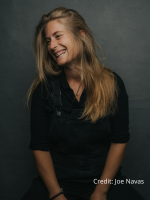Benjamin Rapoza tends one of a hundred and forty-five plots at Dartmouth’s Helfand Community Garden. He says about half the gardeners live in the city of New Bedford, and the rest come from Dartmouth and the surrounding suburbs.
"A lot of residents in New Bedford either don’t have the land, or they’re renters so they can’t use it, or there’s lead contamination," he said. "We also get a lot of people from suburban areas who have backyards but don’t want to cut down the trees in their backyards."
This makes for diversity both in terms of the plants growing in the garden and the people tending them. The New Bedford area is home to immigrants from all over — from Cape Verde to Puerto Rico. But it’s best known for its Portuguese community, with fifty-five percent of residents — including Ben — claiming Portuguese heritage.
"We grow a Portuguese variety of kale, it’s unusual, it looks almost like cabbage, like it’s got thicker ribs, but Portugal, it’s one of those things where every village has its own variety of kale and the village next door like they don’t know what they’re doing with their variety of kale, we’ve got the kale variety you want to grow."
Ben says a lot of Portuguese descendants at the garden also grow beans and a particularly beloved variety of slicing tomato.
"There’s also an heirloom tomato variety that’s really popular called the Neves Azorean and that’s actually a variety of tomato seed that was brought from the Azores. The story is it was continued this heirloom variety by a backyard Portuguese gardener in Massachusetts and one year he traded his seed for fertilizer, that’s how the seed made it out into the world," Benjamin said. "And now the Neves Azorean is one of the most popular heirloom tomato varieties in the country right now."
The name comes from the gardener, Antonio Neves, who immigrated to the Boston area and slowly bred his Neves Azorean into the plant it is today: heavy yielding with huge, 1 to 3 pound fruits — which according to its fans, are the ultimate sandwich tomato. Ben says another gardener with a plot near his is Chinese, and she’s growing something he’s never seen before:
"Bitter melon," he said. "It’s a southeast Asian specialty."
He explained that it looks like a cucumber but it’s covered in spines.
Bitter melon, also known as bitter gourd, is native to Africa and is used as a folk remedy in African and Asian healing. Salted and cooked it’s popular in stir-fries and with eggs and it’s said to treat diabetes, skin diseases, and respiratory illness.
Another plant Ben’s been inspired to grow by others at the community garden is the Hakurei turnip.
"They’re a little bit bigger than a radish but not as peppery, it’s almost like an Asian pear but not quite as sweet."
Benjamin mostly eats them raw, or he ferments them. "So like I’ll do a natural fermentation with garlic and basically have a hakurei pickle which is one of my favorites," he said.
The land that makes up the Helfand Community Garden was donated in 1996 to the Dartmouth Natural Resources Trust by a family of Russian immigrants. They first arrived in the United States fleeing pogroms in the late 1800s, attacks that targeted the Jewish community in what today is Belarus. The Helfand family fled to Massachusetts and today their land is open on a first come first serve basis to any local resident longing for a growing space of their own.
—
This piece first aired in March 2022.











